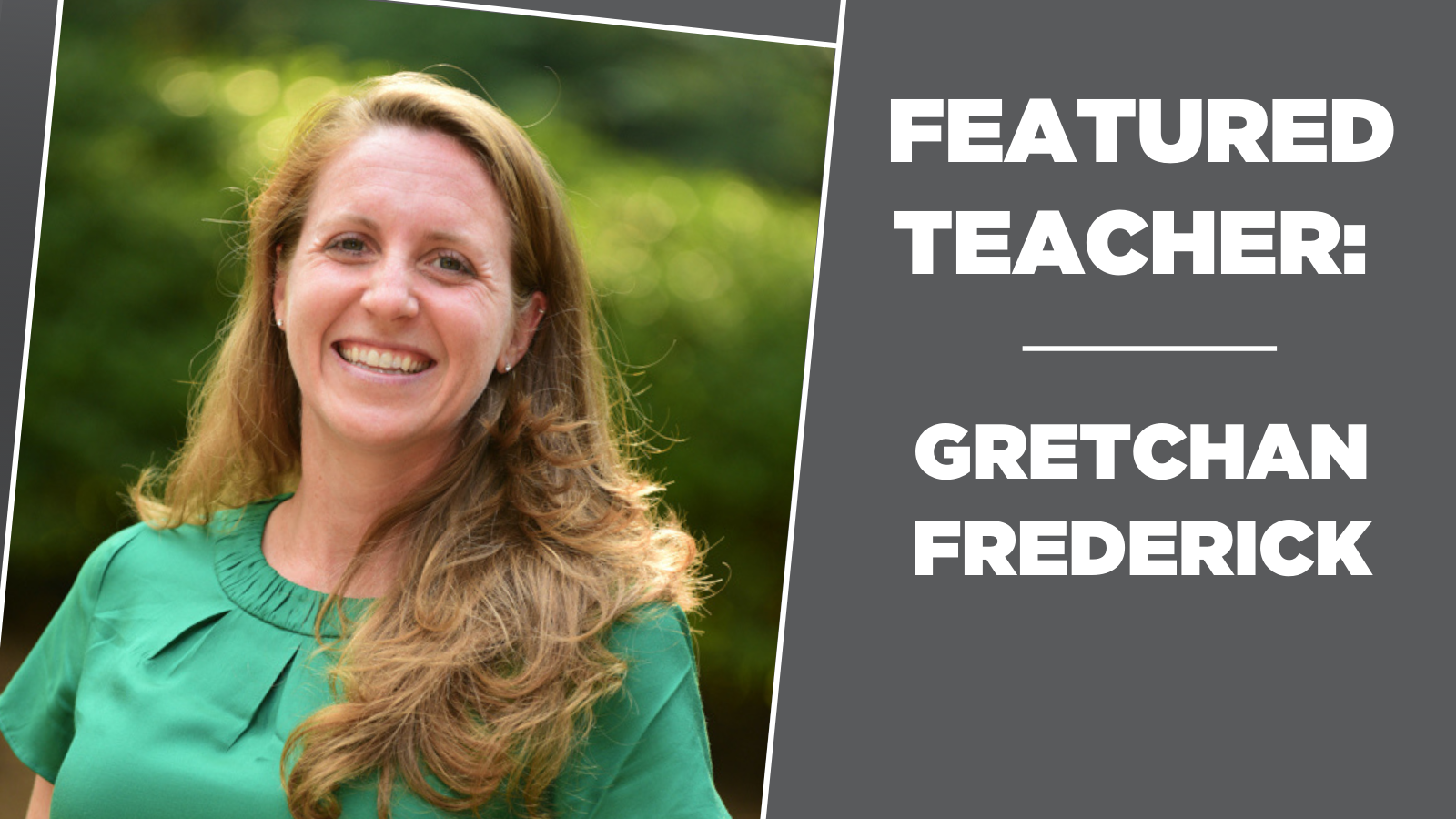
Entrevista a la Profesora Gretchan
COMPARTIR
Tell us about yourself:
My name is Gretchan Frederick and I am an Upper School Spanish teacher at Charlotte Latin School, an independent TK-12 school in Charlotte, NC. I teach AP Spanish Language and Culture, AP Spanish Literature and Culture, and Spanish IV Honors, which is the course we offer to our intermediate high, pre-AP students. I have used Radio Ambulante with my students in each of these courses, but the way I choose to use the episodes differs with each level.
How have you used Radio Ambulante in your classes?
I have primarily employed Radio Ambulante in my Spanish IV Honors and AP Spanish classes. All of our classes are thematically organized and we do not use a traditional textbook in most levels, so Radio Ambulante is a great way to incorporate stories and lessons with “real world” connections. By listening to different episodes through the year, we can have discussions in class based on a specific episode without leaving our themes behind. The AP themes – Global Challenges, Personal and Public Identities, Contemporary Life, Science and Technology, Beauty and Aesthetics, and Family and Communities – are wide enough that a well-produced show like Radio Ambulante is an invaluable resource that fits into almost any category and multiple categories. I always tell my students that I want their experience in my classes to be “interesting, relevant, and challenging,” and using Radio Ambulante is a way that helps me push my students to learn more about the life outside of the “bubble” of our classroom and our school community.
In Spanish IV Honors, studying a typical Radio Ambulante episode can take one to two weeks of class time, but it’s worth it! These episodes are some of the parts of class that my students remember even after they have graduated because studying one of these episodes in class allows them to make the connections beyond themselves, to hear directly from others about their lives and the things that affect them. I always open the approach to the episode with a general question or two that connects broadly to the theme we are studying as well as to the topic of the podcast without getting into too many preliminary details. For example, I love using “Postal de San Salvador” in my Spanish IV Honors class when we study immigration. Before we even listen to a second of the episode, I have my students think-pair-share about an activity or pastime that is particularly meaningful to them, why they enjoy it, and what it might feel like if they could no longer engage in that activity. Central to the episode is the personal enjoyment that Iris gets from dying her hair, but then there are the potential ramifications that may result from her having her hair dyed a particularly distinct color. I also use “El estudiante rebelde” with my Spanish IV Honors students and we open the discussion with what they think the title might mean, if they’ve ever said something that they later regretted – or didn’t – and what they would want to say at graduation, if they were allowed to give a speech (we do not have any student speeches at graduation). The students in Spanish IV Honors are mostly juniors, but there are always a handful of seniors so this particular opening discussion, and the whole episode, really grabs their attention. When I use “Deuda” in class, we spend some time before listening to the episode talking about how credit cards work. They have no idea. It’s a great life lesson. Then what can talk about whatever a “bono” is!
Once we have had our opening discussion, or answered the questions for homework, I have usually identified some key vocabulary (unfamiliar words or idiomatic expressions or turns of phrase, if there are any) and they are responsible for those definitions, explanations, or synonyms when possible. After that preliminary work is done, we are able to get down to the business of listening to the episode. I like to divide the episode up into manageable sections with comprehension questions, with a quick internet-based investigation, or with a reflection question to make sure that students are understanding the story and continuing to apply it to our theme(s) and their own experiences. I like to mix up how we do the listening and which tools I allow them to use. Sometimes we listen to a section together in class and then we discuss what we understood and work through any theme-based questions I might have for them. Other times they listen for homework and I might allow them to listen with the transcript of the episode, but typically not the translation. In the case of “El estudiante rebelde” it is helpful to listen to Benjamín and read the transcript in order to get used to his Chilean accent. When we have finished listening to an episode, I always try to ask a summary reflection question, or I ask a question about the presence of our themes of study within the episode: “We have studied this episode as a part of theme X, but how are themes Y and Z present in this episode as well? Give specific examples from the episode.”
In AP Spanish Language and Culture, I do things a bit differently because they are older, more advanced students, and they have previous experience with Radio Ambulante from the year before. With my AP students, I provide them with a curated list of episodes from across the different seasons of Radio Ambulante that I think are most relevant to the AP themes and most accessible to high school students, either by topic or level of language used in the episode. I give them the list with episode descriptions and a key word or two to allow them to decide which episode they would like to listen to over the course of a few days. We had a long weekend in early October of this year with Monday, Tuesday, and Wednesday off of school, so I Assigned them a “your choice” assignment of one episode from the list on Friday before the long weekend and had it due the Thursday we returned after the break. Students then did some small group work, sharing what they listened to, why they chose it, what they learned, what surprised them from the episode, etc. While I assigned this over a long weekend, it could easily be a two or three-night assignment while you work on other things in class. After listening, students can do all kinds of different things: journal-based reflection about the episode, small group conversations, short presentations, research something mentioned in the episode, research to see how the situation has developed since the episode aired… there are a lot of possibilities. This time around, after my AP students had listened to the episode of their choice, I asked them to identify what the episodes had in common in terms of the theme in which we were currently working, Personal and Public Identities. It’s always much easier to identify differences, but there’s more value, I think, in finding those common threads in two stories that might seem to be entirely different from each other.
Can you tell us about your student reactions or any other recommendations?
A key element to my use of Radio Ambulante in class is that I never take the transcript and use it as a fill-in-the-blank exercise. There are other audios, news reports, etc. that can be used for that type of work in class. The value in Radio Ambulante is following the arc of the story over the course of 30-45 minutes, hypothesizing, researching, and making connections to our themes and our lives. Hearing the voices of the people involved brings these episodes to life in a way that reading an article on the same topic does not. I think my students understand that and see the value in it as well. They react audibly to moments of suspense or surprise, or there’s the inevitable, “Oh no…” that gets muttered in class when they start connecting the
dots of where the story is going to go. I have used “Deuda” several times in Spanish IV Honors when we discuss Puerto Rico (the history of colonization, the debt crisis, Hurricane María, and statehood vs. independence make up our Contemporary Life unit, which also overlaps with Global Challenges), and hearing Edwin’s voice when he talks about the money he saved and his VIP status with his bank makes the fall of his personal portfolio that much more meaningful, more multidimensional. Edwin’s a real person! That’s his voice! My students also react very realistically and understandably to the rate of speech and difficultly of someone’s accent. This is only natural. It is also a good reminder for them as to the wide variety of accents of people who speak English. Neither language nor its speakers is a monolith, and there are wonderful regional differences and nuances that they can begin to absorb.
What would you do differently next time?
If I could change anything that I’ve done with Radio Ambulante, I would say I would always like to include more episodes – I could base an entire course around what is available – or to ask fewer comprehension questions. Depending on the episode, the students don’t need to understand every minute detail in order to get a lot of meaning from the experience. Additionally, especially in the current socio-political climate, I’d like to be bolder in my episode selection and use some that may be more challenging to have the tough conversations, especially about identity, in class. I think students, especially the ages I teach (high school juniors and seniors), are looking for those outlets and spaces where they can work through what they think and why. Reacting to a story can be a good place to start, and Radio Ambulante is there with a lot of great jumping off points.
How I use “Deuda” in Spanish IV Honors:
Class time: 2-3 weeks with pre- and post-listening activities
Class meetings: 5 days/week, 45-minute class periods
Theme: Contemporary Life, Global Challenges
Day 1: What do we know about Puerto Rico?
- Basic questions, true/false questions
- Overview of history of colonization of PR
- Explanation of its status as a “territorio libre asociado” – what does that mean?
Day 2: Pair-Share responses to thematic introductory questions on p.1-2
- What is debt? How do credit cards work?
Day 3: Vocabulary
Day 4: Listening and comprehension questions (there are a lot of ways to do this)
- Together as a class, small group work to answer questions
- Or individually, questions answered individually or in small groups/pairs, etc.
Day 5: Investigation 1 – The New Deal, America’s spending on infrastructure Investigation 2 – What is the 936?
- Divide class into two groups, have them research and present to the other group
- What do they know about the New Deal from History class, AP US History?
Make it interdisciplinary, bring in background knowledge from other subject(s)
- Teacher can add in any missing information/correct misunderstood information
Day 6, 7, 8: Listening and comprehension questions, final hypotheses
- What are bonds? How do they work?
As general or as specific as the teacher wants to get, depending on comfort level
Day 9: What has happened in Puerto Rico since this episode aired?
- Hurricane María, video “Hurricane María devastates Humacao”
- Article, NY Times “Puerto Rico enfrenta enormes obstáculos para recuperarse” • How does the “deuda” and everything we just learned from the podcast make the hurricane recovery more challenging?
Day 10: Puerto Rico’s recovery after María
- West Side Story – plot summary
- West Side Story “María”
What’s the name of the hurricane?
- Lin-Manuel Miranda “Almost Like Praying”
What did LMM do musically?
What are the “lyrics” of the song?
What’s a rosary?
Why is this song titled “Almost Like Praying”?
Who are the people in the video?
This lesson makes a nice conclusion to the unit, and teachers can choose to stop here. I continue into a related unit about whether or not Puerto Rico should pursue statehood or independence, or maintain the status quo. I provide students with a variety of articles and interviews with different points of view on the topic, including a recent interview with Residente of Calle 13. Students will be familiar with Calle 13 as they have studied the song “Latinoamérica” in a previous class. To conclude this unit, students have to write a persuasive essay, supported with sources we have used in class, arguing either for statehood or independence (this is preparation for the AP Exam persuasive essay free response task they will do if they take the AP course the following year).
How I use “student choice” in AP Spanish Language and Culture
Class time: 3-4 homework assignments, 1-2 class period s
Class meetings: 5 days/week, 45-minute class periods
AP Theme: Potentially all of them!
Day 1: Provide students with the document “AP Radio Ambulante – escoger un podcast”
- I have listened to all of the episodes on the list in order to gage appropriateness, etc.
- Explain the assignment – not just the HOW, but also the WHY.
- Answer any questions.
Homework (2-3 nights): Students listen, taking notes.
- Who are the main characters involved?
- What are the major plot points?
- Note any new, relevant vocabulary, look up definitions
- If needed, students can listen and read the transcript, but I encourage them NOT to use the translation. I do acknowledge that it is available, but I return to the WHY of the assignment with them.
- Because this is a long-term homework assignment, we are working on other things together in class.
Day 4: Small group or pair conversations in class about their episodes
- Pair students who have listened to different episodes
- Remind them that they are working in interpersonal mode, which requires them to ask and answer questions with their partner, not just talk at that person.
- This conversation is a “rough draft” of a written reflection they will do for homework (or in class the next day), so they should use their time well knowing that they are seeding ideas for a future assignment.
- Give them some “muletas” to get the conversations started:
What episode did you listen to? What happened?
Was the episode what you thought it would be when you chose it?
What questions do you want to know more about now that you’ve listened to the episode?
Ask 2-3 additional follow-up questions that show you were paying attention to your partner!
How do the episodes relate to X theme? What about themes Y and Z? (Or all the AP themes in the Venn Diagram of the course.)
What do the two episodes have in common?
Students seemed to enjoy the choice provided in this assignment, even thought I had pre selected the episodes they could choose from. The question about what the two episodes had in common provided some surprisingly profound answers and was a much better question than I had anticipated, especially for the pairs with two very disparate episodes.
Homework (1 assignment), or Day 5: Written reflection using the questions on p.2 of the “Escoger un podcast” document.
- Remind them that they have discussed these questions in pairs.
- Remind them of the level of written expression necessary.
- They can use their notes, Word Reference, etc.
- If they’re writing in class, it can be a timed exercise or not. They can be allowed to use their notes or not, depending on how much the teacher may want to simulate the AP style free response questions.





